25th May 2014 | Mariam Barghouti | Occupied Palestine
Since 1967, Israel has detained around 20% of the Palestinian population and approximately 40% of Palestinian males. The majority of those arrested are transferred into Israel, where they are held and if charged will most likely serve their sentence. Although this is a clear violation of Article 76 in the Geneva Convention which states “all protected persons accused of an offense must be detained within the occupied country and if they are sentenced, they have to serve the sentence within it” Israel continues to transfer prisoners to its territory. As of April, 2014 approximately 5,021 Palestinians were being held by Israel. Of the aforementioned number, 22 Palestinian women are being held in Israeli jails.
Palestinian prisoners are subject to various levels of both physical as well as psychological torture. These tactics begin at the moment of the arrest and are carried out during the investigation where they continue until even after the prisoner is charged. Additionally, Palestinian women are subject to sexual harassment by Israeli jail guards as well as soldiers and police officers during their detention time. You can read more about Palestinian women held in Israeli jails here.
On April 11th, I was arrested in the village of Nabi Saleh and wrongfully charged with stone throwing as well as assaulting a soldier. The testimony of a 20 or so year old soldier was enough to push for indictment and send me to Hasharon jail held in Israel.
There I was in the same jail cell with Lina Jourbani, Muna Qaadan, Intisar Sayyad, Alaa Abu Zaytouneh, and Shireen Issawi. I am eternally grateful for the kindness and love they showed me, for their patience, and of course for putting up with my awful singing.
The below are excerpts from my jail journal diaries that I have written throughout my stay in Hasharon. These journals are written by me, but this is hardly about me. It’s about the harsh reality and the macabre these women have to face. This is a fraction of a fraction of the ugliness some of these women have endured for years, one of them for 11 years.
If one word describes these women, it’s endurance.
Entry one:
“After 12 hours from bus to bus, from one dark cold box, to an even
darker and colder box I was finally brought to Hasharon. I was placed
in room number 1 with five other women. I was dirty, afraid, tired,
hungry and distraught. I find an empty top bunk bed with Fulla
(barbie) bed covers and five sleeping women. At that moment, I was
greeted with a half awake Muna Qaadan.
I wanted nothing more than to climb into the bed, lay in the fetal
position and sleep. I wanted nothing more than to be a child again.
But the reality we live in wouldn’t allow it.
On the top bunk there were stickers of Tweetie, Mushroom houses,
Cinderella and other children cartoons. The reality is that they’re
probably there because they’re some of the few things Israeli forces
will allow inside the jail cell; In my head however, I couldn’t help
but think of them as stickers that resemble these women’s hijacked
innocence. Their hijacked childhood. So they make up for it, by
putting little toys and cartoon stickers around.
My first night, I pretended Fulla’s hand printed on the bed sheets was
mama’s hand extended from her bed in Ramallah to my bunk in Hasharon.
My first night, I cried. I hadn’t cried in ages and on April 12th at
4:00 am I finally cried.”
Shireen Issawi, sister of former hunger striker Samer Issawi was transferred from Maskubbiyeh in Jerusalem where she was in solitary to Hasharon earlier in April. Issawi suffers from back pain due to the awkward positions she was placed in whilst under interrogation and when being transferred from one jail to the other.
Shireen is being held unjustly in Israeli jails as she states that “Israel is targetting any lawyers that are active in the case of Palestinian prisoners especially those that are in contact with the families of prisoners.” Despite the pressure and harassment Issawi underwent, in jail she always held a smile and made jokes at almost everything. At one point, jokingly, Lena Jerboni jests and asks “why are you always talking, Shireen?”
“I was in solitary, I have to workout my tongue again! Let me laugh!”
Shireen is joy.
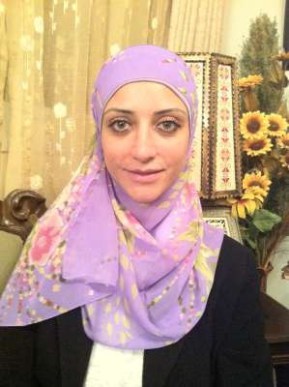
Entry two:
‘Jail (Hasharon), is unpleasant, the situation, environment, treatment,
commodities, the are all organized around psychologically ruining the
individuals involved.The game of psychological manipulation begins way
before you enter the jail cell. It begins with the start of
colonialism.
But here, it’s different. It’s more tangible, less abstract and
definitely harsher. The buses (read 1×2 boxes) they put you in are
filled with trash, pests, and of course you’re cuffed by the feet and
hands. Even if one isn’t cuffed you still can’t move. All you hear
outside is Hebrew, yelling, police singing obnoxiously and of course
the occasional banging on your door.
The most humiliating part was the occasional “check up” where
different officers open the hole in the door for a few seconds, close
it, I hear laughter and then another does the same. It’s as though I’m
the latest specimen in their experiment with lives.
How are we so quiet with this not even in our backyard, but right
here, in our front yard?
Israel’s idea of democracy is interchangeable with the abuse of the “other.”
Lena Jerboni is currently the longest serving Palestinian female prisoner. She was sentenced to 17 years and has served 11. In jail, Lena is considered the dean of the prisoners. All of our affairs went through her first. Despite her young age, she acted as an older sister to all of us. Some prisoners, although older than her call her Khalto.
As I craved a cigarette and asked for one. Lena turns her head towards me and firmly says “no. We don’t have slaves here.”
Lena is one of the strongest women I met and the most fragile. Jail has become everything she knows. At one point during my incarceration we had a conversation in which myself and the other girls were trying to explain the style of skinny jeans and what they were.
We laughed. We laughed extremely hard. However, inside our souls wept. Wept for the reality of existing but not living, and we wept out of fear of jail becoming the only reality we knew.
Lena is wisdom.
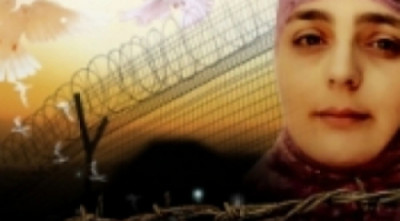
Entry three:
‘It’s day 5 of me being in prison. Half of the time I spent from one
bus (box) to the next. This strategy is designed to break you. To make
you dread going to court and to crave stability, even if it comes in
the form of an unjust jail.
It’s day 5 and I’m already accustomed to the cockroaches. They’ve
become the reminder of outside interaction. It’s only day 5 and I’ve
become so indifferent. So numb.
I know I did nothing wrong so let them do what they want. I’ve read
too many books, I know better, I know the conviction rate is 99.7% for
Palestinians, innocent or not. And we’re all innocent.
The court room in Ofer consists of a trailer and in it some chairs and
a bench. Military court consists of a judge that has already decided
you’re guilty and the only thing being negated is your punishment.
Saying it’s absurd is the understatement of the century.
Ironically, whenever I’m being moved from one bus to another one of
the police has to say “Israel is the only democracy in the world.”
well, at least they’ve upgraded from “the only democracy in the Middle
East.”‘
Palestinian prisoner Intisar Sayyad has been in Israeli jails for 2 and a half years and is scheduled to be released June 9th 2014. She spoke to me about the “bosta” which are are cells hidden inside buses that prisoners are transferred in. Israel uses these to break the prisoners and make them wish to be charged with anything at all, simply so that the dreadful journey will end.
Instisar recalls her trips in the bosta “at one point I begged my lawyer to have them charge me just so I don’t have to endure those humiliating and painful trips.”
Intisar had the warmest heart and kept reiterating her nostalgia for her kids and their hugs. She kept comparing me to her 19 year old son, saying “You’re almost as old as my son, I haven’t seen him in a long while, but you remind me of my son.”
My last night there at 3:00 am as I was being taken from Hasharon back to Ofer for my third trial in one week, a half awake Intisar looks at me, takes a gray sweater from her clothes and gives it to me. She has known me for a few days and the kindness she has showed me measures to that of an eternity. She says, “take this habibti, it’s going to be a cold one.”
Regardless of how little they have, the prisoners always managed to share everything. When one appears to be in pain another consoles and a third ensures that the room is sanitary and clean. Their togetherness is outstanding.
Intisar is warmth.
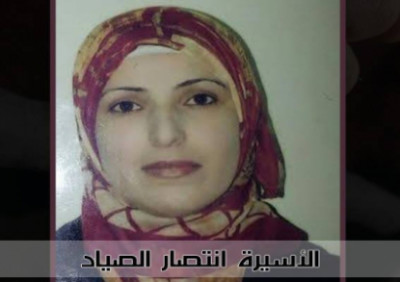
Entry four:
‘Jail, like colonisation is ugly. The girls here have developed such an
intense sense of humor that helps them cope with the shit around them.
We have glorified them for so long, like we do with most people coping
with their misery. We drape the ugliness and we should stop.
They are not superheroes. I see the hurt, their pain, the nostalgia,
the longing. Their hears are broken, their souls are jaded and that’s
okay to feel. We need to acknowledge the negatives rather than hide
them with a facade.
The girls are needle point organized, I think however that this ideal
is adopted throughout their time here to gain a sense of control on
what seems to be an uncontrollable situation..
Time passes by so slowly here, eternity’s definition should be Hasharon.
I tried to make games for the girls, even to get them to meditate or
try and change up the mood a little. It worked, for about 5 minutes
and then I realized, horrible things are meant to be horrible. There
is no bright side to unjust incarceration.’
Alaa Abu Zaytoon just 21 years old has served a year and 3 months since her arrest. She was sentenced to two years.
The entire time Abu Zaytoon kept recounting the time she has left of her sentence. Her dream is to have a baby girl and name her Nagham “so she can be my music” she used to say.
Alaa, had the patience to sit down with my stiff hands and teach me how to craft jewelery and to do my laundry with the supplies we were allowed.
She had such a whimsical voice and was constantly making fun of everyone.
Alaa is patience.
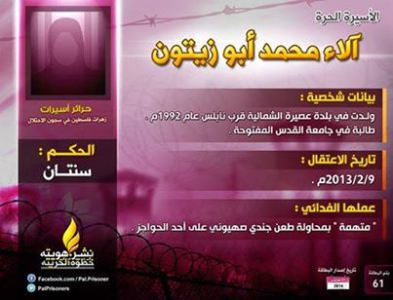
Entry 5:
‘I recall when I saw my lawyer after a weekend in jail I felt safe
again, and then he looked at me and said they’re looking for
indictment. I cried and I remember apologizing to my lawyer for
crying. Then I saw friends and family in the court and I wanted
nothing more than to cry in their arms.
I felt weak.
Weak and guilty.
Guilty, because I am showing my weak side out and publicly. We have an
indoctrinated dogma that we should always be strong. Never weak.
That’s what’s fucking us up. It’s okay to be weak, long as you don’t
allow it to control you and stop you from doing what you can. But it’s
okay to be weak and to acknowledge it.
We are not invincible superhumans and the world needs to fathom that.
Enough with the romanticism. Being here gave me the greatest reality
check of all time. Sharing a 4×3 room with Intisar, Muna, Lina, Alaa,
and of course Shireen put things into perspective.
In a few hours I’ll begin the box journey to Ofer again. Hopefully
it’s the last time and the final trip I have to make.
I hope to never see these women again, unless it’s when they’re free.’
Muna Qaadan, aged 42 with the spirit of a 20 year old was the first prisoner that I met. She’s from Jenin and her detention has been extended for the 14th time by Israeli forces. Muna got engaged in jail and looks forward to being free and married.
She was the one that always gently caresses our hair, or sternly commands us when things need to be done. She was commanding but gentle.
Muna is longing.
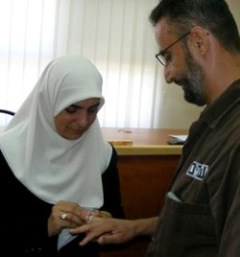
These are the women I had the honor of meeting, and this is a fraction of their stories. Israel has indiscriminately tortured all women in Israeli jails at one point of their incarceration and continues to perform violent acts every now and then to exert their power.
It is those that seem least powerful that possess the most strength, and the powerful are the cowards.
